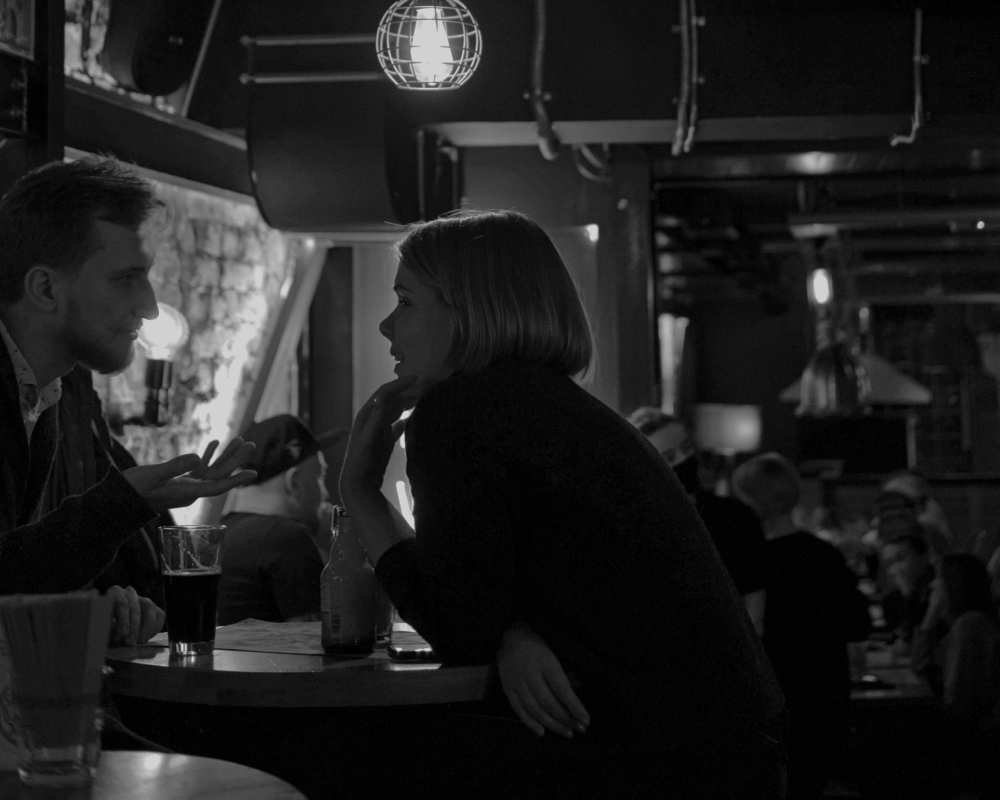Bobo sent the staff home. Of course he already had a key to the bar. He had been in New York for all of a week, had landed from Beijing scarcely the weekend before, but he already had a key to the bar.
“We’re going to noodle a bit,” said Bobo. “I want—” he placed a possessive hand on the piano he did not own and had only very recently even met, “I want some time with the box. I’ll lock up,” he said.
The owner left right away, but one of the bartenders lingered, as if waiting for an invitation to stay. I avoided her gaze. Bobo was busy behind the bar and didn’t notice.
“Xinku le,” he said again, despite the fact that the bartender was highly unlikely to know Chinese. “Thanks for your hard work.”
Eventually she left, and we were alone, in Lunàtico.
I sat on the edge of the stage.
“Make yourself at home,” said Bobo.
He went behind the bar and pulled out a plate of chapulines, fried grasshoppers. Then chopped a bowl of orange slices and sprinkled them with sal de gusano, a smoky worm salt. He cradled the bottle of mezcal in his chapped hands and brought it to me, showing off the label with pride.
“100% agave,” he said. “Distilled in a claypot.”
A friend had brought him the bottle, which he gifted to the bar.
“A friend,” I said.
He chose not to respond.
We dangled our legs off the edge of the stage, spotlit. Sitting like that, we were as good as blind, sucking worm salt from orange slices.
“Impossible to get this in China,” he said. “What a treat.”
He hummed the song from the last set.
“You know,” I said, “when a woman sings that song, it’s a lament. Aretha sings it almost like a howl. But when you sang it tonight, you sounded… bemused.”
“Bemused?” he says. “Was it my accent?”
“You don’t have an accent,” I said. “It isn’t your accent.”
“Bemused,” he repeated. “That’s good, baobei. That’s good, baby. That’s good.”
He tried it out on the lyrics.
“A woman’s not a plaything,” he sang, trying out wonder, trying out astonishment. “A woman’s… not a plaything?”
He rocked slowly and sang the lines. I sipped the mezcal. I sucked the worm salt. We were both still blind in the spotlight.
“It’s like I’ve just come to the realization,” he said. “And I’m warning my fellow man. I’ve just come to a horrible realization, that a woman’s not a plaything. That a woman is a human.”
He went over to the piano and hit a foreboding set of chords.
“Brothers! Comrades! Terrible news, qing qian lai ling ting wo de jiang hua, come listen to what I have to say. With much regret, I’ve come to learn: that a woman is a human, just like a man.”
He wagged his finger at the imaginary crowd in warning, then sat down on the piano bench and set the opening chords to the song. He sang it out, practically screamed it, and my eyes closed unwillingly. My skin crawled and blood rushed to my neck. Oh, I thought. That fucker. That absolute motherfucker. He’s got it this time.
Bobo used only his left hand on the keys, his right hand resting on his thigh. His chords were spare, leaving plenty of space through which to sing. Bobo was a pianist for sure, a singer only incidentally. His voice dangled on the edge of each note precariously, climbing onto the next note only through extreme effort and force of will.
“A woman’s not a plaything,” he sang. “A woman’s not a plaything.”
He left the piano and rejoined me on the edge of the stage, helped me suck the last of the worm salt.
We finished the mezcal. We opened a sotol. I asked for water. I drank the water, then more sotol.
“We’re all adults here,” he said at one point.
“Some of us more than others,” I responded.
The next night Bobo sang the song again, at the end of the last set, and this time for a full house. He sang it bemused, as a lesson still unlearned, an innocent man on the cusp of a terrifying revelation. King Claudius repents his crime, he all but sang, but will not give up the queen. His words fly up, words without thoughts never to heaven go. A woman’s not a plaything.
It brought the house down. I watched an old woman in her furs applauding while she cried. She was crushed next to a young saxophonist from the Bronx, and I noticed that their faces were temporarily twinned, rendered identically grotesque in the catharsis of the moment.
A waitress scampered from table to table with a box of tissues.
“Oh,” she said. “Oh, oh, oh. Here. Oh, oh, oh.”
“Out,” said the bar owner, immediately after the end of the set. “Everyone out. Get out. Out.”
Bobo and I helped him put up the chairs, and as Bobo set the last chair, an ambulance drove by, bathing the bar in blue and red lights. It prompted Bobo to sing—if not howl—America the Beautiful. And then again, we were blind in the spotlight.












